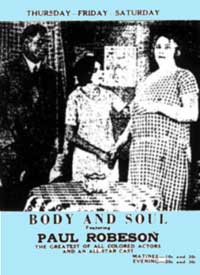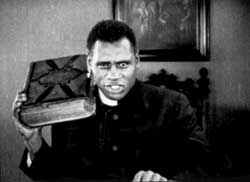 Paul Robeson's first film was Body & Soul (1925) directed by Oscar Micheaux, America's first important black director, & one of the most important independent filmmakers of any race in all cinematic history.
Paul Robeson's first film was Body & Soul (1925) directed by Oscar Micheaux, America's first important black director, & one of the most important independent filmmakers of any race in all cinematic history.
A stranger, Yello-Curley (Lawrence Chenault), comes to town, a small time gangster with dandy manners. He has something on the Reverand Isaiah T. Jenkins (Robeson) which makes the preacher assist him in getting gambling & booze to members of the congregation.
Unbeknownst to the locals of this all-black rural community, when Isaiah was gone from the community for a few years, he became known as the notorious Black Carl, a dangerous man who served time in prison. The name Oscar Micheaux chose for the figure of "Black Carl" was a well known villain-name from vaudevillian melodramas.
The film doesn't fill this in very well, but we can suppose the town thought Isaiah was away at theologian school since he returned an alleged preacher. But Yello-Curley served time with him, & knows the truth, that Isaiah is an escaped convict.
The reverand also has an agreement with the local rum runner & saloon keeper (Marshall Rogers) taking bribes to restrain himself from telling his flock not to drink. The arrival of Yello-Curley somewhat upsets the applecart, but as the largess of Yello-Curley hinges on keeping his mouth shut, he does.
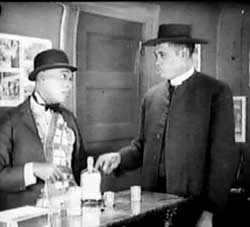 Martha Jane (Julia Theresa Russell) is a local matron of some social significance to the community. She's so head-over-heels devoted to the tall good-looking preacher that other women just follow her example. And when he becomes a menace to her daughter Isabelle, she can't tell her mother. Martha Jane (Julia Theresa Russell) is a local matron of some social significance to the community. She's so head-over-heels devoted to the tall good-looking preacher that other women just follow her example. And when he becomes a menace to her daughter Isabelle, she can't tell her mother.
Isabelle is played by Mercedes Gilbert, who Micheaux discovered by means of a beauty contest. He would later marry her sister. Mercedes had some success in New York & even Broadway stage productions This never quite translated into much of a film career, though she can also be seen in Edgar G. Ulmer's Moon Over Harlem (1939).
When Isabelle discovers she needs to marry & do so quickly, she turns to gentle Sylvester, the preacher's twin brother also played by Paul Robeson. Again the film is a mite chaotic about there being two characters who look exactly alike but slowly it becomes obvious that Sylvester is a completely different guy, & a nice one. He's not much in the story, however, & Robeson has only a little opportunity to create a convincing good twin/evil twin contrast.
Sylvester is struggling for success but hasn't as yet achieved it, & Isabel's mom doesn't think he ever will, for she's a terrible judge of character. Sylvester is pretty much run off, while Isabelle encourages the reverend's interest in the girl.
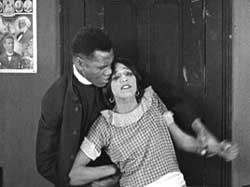 But Isabelle has seen the Reverend's greater attribute as a drunken sinner & rapist. And now he is trying to groom her to be sold to the gangster Yello-Curley who'll take her away to become an "entertainer." So she flees to Atlanta to escape her misguidedly proud mother & the malevolent preacher, living as a beggar with a dreadful apartment underneath a viaduct. But Isabelle has seen the Reverend's greater attribute as a drunken sinner & rapist. And now he is trying to groom her to be sold to the gangster Yello-Curley who'll take her away to become an "entertainer." So she flees to Atlanta to escape her misguidedly proud mother & the malevolent preacher, living as a beggar with a dreadful apartment underneath a viaduct.
By the time her mother Mary Jane tracks her daughter down, Isabelle has grown seriously ill with hardship. Finding her bedridden in her horrible apartment under the road, she listens to her daughter tell the terrifying adventure of the stormy night when the reverend took forceful advantage of her, & later stole Mary Jane's savings for which Isabelle was blamed.
Ma belatedly puts a few things together in her mind & realizes she'd been disbelieving her poor innocent daughter who in consequence now lay upon her deathbed.
The grieving mother in church the following Sunday watches Isaiah, marveling with welling hatred that this drunken scoundral so easily fooled a town while raping girls & consorting with known criminals.
Martha Jane sees to the reverend's downfall. He becomes a hunted man in a gruesome climax of come-uppance, though her own grief is unassuaged.
However, at the film's rather cheating post-climax, it turns out it was all a dream. When Ma wakens in the morning, she realizes she has a second chance to be a good mother, & permits Isabelle to marry Sylvester, who has in the meantime begun to achieve success.
This corny coda was imposed by censors who demanded the portrayal of a preacher as evil to be softened or negated. Oscar would otherwise have left it an extreme tragedy.
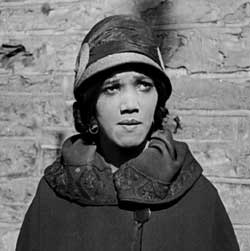 It is suprising to see how critical director Oscar Micheaux could be of clergy & this easily fooled congregation. It is suprising to see how critical director Oscar Micheaux could be of clergy & this easily fooled congregation.
While white directors in such films as Hallelujah (1929) & Cabin in the Sky (1943) & Tails of Manhattan (1942) would hold close to their hearts the stereotype of the black community's naive & wholehearted devotion to their churchs, it took an African American director to show that this devotion could extend even to a thieving criminal eager for nothing but the collection plate & access to the prettiest daughters.
The theme of an evil preacher was daring stuff, precursor to Night of the Hunter (1955) in which the preacher's nicely sung hymn becomes a sound of terror. And how many other filmmakers of the era had the guts to deal with the issue of sexual assault & a mother's refusal to acknowledge the obvious? A very real issue, not treated at all exploitatively.
And it says a good deal about Oscar Micheaux's storytelling skill that I nearly forgot this was a silent movie, & could hear the voices of these characters in my mind.
The film isn't perfect, however, as there are a couple confusing moments in the film. At first it seems fairly clear "Black Carl" is from outside the community & has preyed on other communities before escaping from prison & taking on the identity of a minister. But then he turns out to be one of a set of twins who grew up in the community, & it's up to the viewer to harmonize this contradiction.
Then there's the matter of Isabelle attempting an emergency marriage with Sylvester, presumedly because she's pregnant, but not later seeming to be pregnant after all. Likely these lapses are due to the loss of important scenes, as Oscar was forced to pare down & reshape the film due to complaint of censors, resulting in injury to continuity. Some of the missing scenes have been restored in the Criterion edition, but others are long lost.
Still, in general, it's a better film than average for 1925 & shows a considerable skill early in Oscar Micheaux's long filmmaking career. In fact he seemed a little better at constructing a silent film than a sound film.
The score for the film was written in 2005 by Wycliffe Gordon, & it's superb, unlike the new score by Courtney Pine the Criterion Robeson set imposed on Borderline (1930). Pine seems to have done his composition without reference to what was going on at any given time in the film. But Wycliffe creates interesting music timed in such a manner as to properly underscore the screen's action.
copyright © by Paghat the Ratgirl
|
